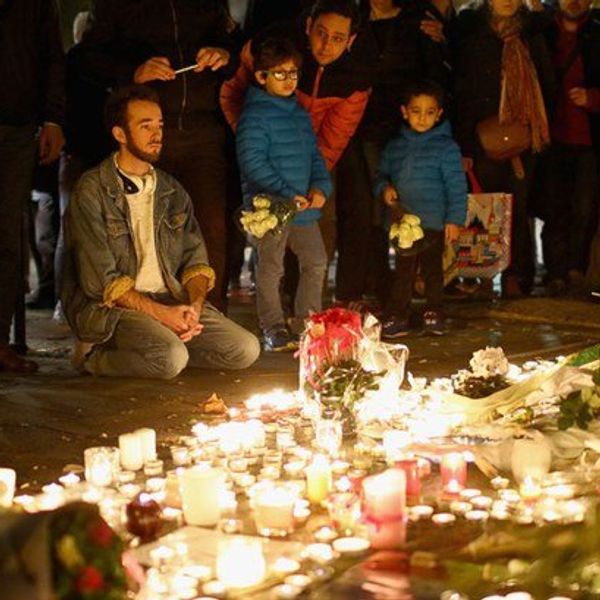I arrived in France this past week for my second year of college, and not too long after arriving, it was clear to me that things had changed since I’d left. I got off the plane, got my suitcase from the carousel, and was messaging my roommate to let him know that I had landed in Nice when I looked up and saw soldiers, dressed in full camouflage gear, holding machine guns. I didn’t remember there being soldiers at the airport. But then again, so much had happened. Things were different now. The airport was still more or less the same since I’d flown home in June. People were still greeting family members arriving from long journeys, tourists were still coming to enjoy the last weeks of summer along the French Riviera. But for all that was the same, those few troops were all that was needed to let those of us in the airport know that the country was on guard.
I got to France on a Saturday. The following Monday, upon arriving to campus, the rest of the students and I went through the security check that had become part of our daily routine since last November. Only now, even that had changed. Last year, if we left for a few minutes and returned, the security guards would occasionally nod and affirm that they remembered us. They’d let us in without looking at our student IDs or checking our bags. It was easy enough to remember the faces of students. There are not even 300 of us, not to mention we make up the entire population of this town that’s under 50. But this time as we left, the guard called out that even if we came and went twenty times, we’d have to be checked every time. Then there were the posters. All around campus, in French and English, posters that informed us what to do in case of a terrorist attack, complete with pictures showing how to find cover and flee to safety. Then we all sat through a presentation which took us through the alarms and routines that would be in use if a terrorist came upon our campus in this sleepy town in the south of France. We didn’t have a presentation like that last year, my first year here. But since then so many people had died, and now it is a solemn duty to address the fact that terrorism is on the minds of many people in this country.
Last November there were the attacks in Paris, and we spent the whole night watching the news. We stared in horror at the TV screen as the death toll jumped when the standoff in the Bataclan theater ended. And then this summer, the attacks in Nice and Normandy. A man in a truck and two kids with knives had set the entire country on edge. Our campus is a short train ride from Nice, hence the soldiers, the posters, the security check, the presentation.
Osama bin Laden is attributed with saying that the goal of his terrorism was to kill America with a thousand tiny cuts. In France, roughly nine people die a day in automobile accidents, and an average of 423 people die a day from cancer. Since I began studying in France, there have been three terrorist attacks. These three attacks are tiny cuts when compared to deaths from cancer and car accidents, but these three cuts leave their mark. Terror really only needs to strike once. It’s a threat that most of us have absolutely no control over, and even in a place like France, where it isn’t an extremely common occurrence; it’s common enough to frustrate the citizens and to make us all think that we shouldn’t be paranoid, but at least aware. It makes people boo and jeer at their prime minister, in their anger wondering when people on French soil will feel secure. Of course it may take some time for France to feel safe again. Look at where I’m from, the United States. One devastating attack, and it’s over a decade of war, drone strikes, torture, xenophobia, and endless vigilance. The greatest effect of terrorism is not the one it has on the dead, but on the living. The survivors bear the burden of the threat and fear, and the consequences of all the decisions made when those who make them feel threatened and afraid.
Will a terrorist attack my campus? Probably not, until one does. And of course, that won’t happen, until it happens. All it takes is the smallest amount of uncertainty to justify serious security procedures. Nobody in charge at our school wants this responsibility, they certainly didn’t ask for it. There can be no joy in having to give a presentation about the proper response to a terrorist attack, to put posters on the wall that express that safety can’t be guaranteed, that all protective measures might prove futile. We will never have to face that situation, unless we do, and that is the way terrorism truly harms a populace. It is not through a massive fatal blow; terrorists don’t carpet bomb or use nuclear weapons. An act of terror comes in two parts: the attack itself, and the possibility of the next. The most important impact of 9/11 was that there could be another one. So things here are essentially the same. The sea is still warm, the town is still beautiful, there’s still men playing accordions in the street at nights, old ladies still tan topless on the beach, we go to class, wake up and eat and sleep, talk with friends, and life still goes on as usual. There’s only the slight sign that things have changed, and that the tiny cuts France has gotten since I first arrived here have yet to heal.





















